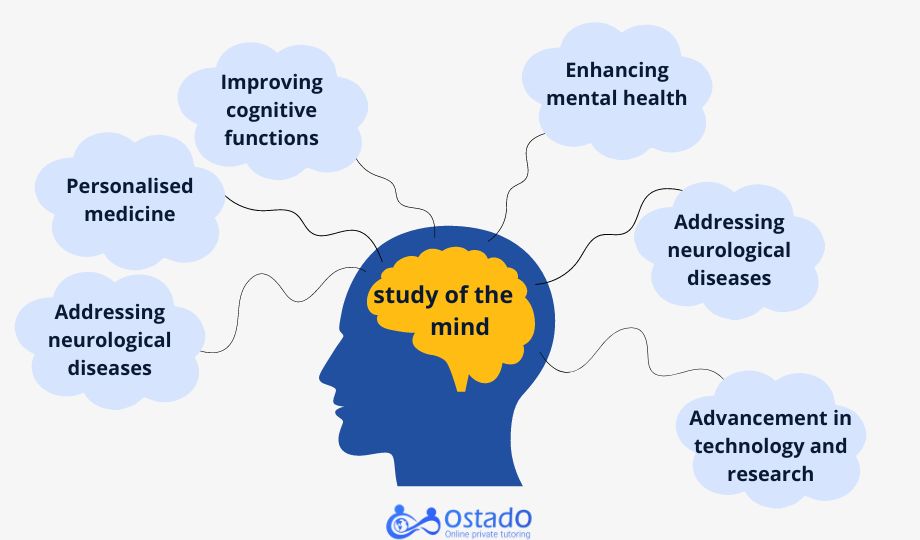“Study of the mind” is one of the topics covered in the GCSE biology exam. It takes a biological approach to what happens inside a person’s head and other related systems. By understanding how the brain works, scientists can develop or enhance medications or even prevent damage to the brain. In this article, I will focus on the concepts you learn in Study Mind AQA GCSE Biology and provide some revision tips to help you get the best results in GCSE biology.
- Try to visualise the abstract biology concepts.
- Try to understand how they are related to each other.
- Use engaging revision techniques such as active reading.
- Practise past papers to familiarise yourself with the exam format.
- Diversify your revision resources to maximise your preparedness for the exam.
Understanding AQA GCSE Biology
AQA GCSE biology is one of the sections in the GCSE examinations administered by the Assessment and Qualifications Alliance (AQA) exam board. The exam assesses the participant’s understanding of biological concepts in two papers. The first paper covers the topics of Cell Biology, Organisation, Infection and Response, and Bioenergetics. The second paper is about Homeostasis and Response, Inheritance, Variation and Evolution, and Ecology. The second paper assesses more complex biological concepts and, therefore, is harder than the first paper.
The format of both AQA GCSE biology exam papers is almost the same. Each paper has 10 to 15 questions, and the total marks for each paper are 100. You can find various question types in both papers; these can be multiple-choice questions, short-answer questions, and extended-answer questions. Regarding the timing of the exam, participants have 1 hour and 45 minutes to answer the questions on each paper.
Study of the Mind in GCSE Biology
The study of the mind in GCSE biology is limited to the biological functioning of the brain, and it does not pertain to psychological concepts in this context. GCSE biology approaches the issue through three main channels.
1. The Nervous System
The central nervous system (CNS) consists of the brain, spinal cord, and the peripheral nervous system (PNS). It is also about how nerve cells are connected and how they transmit electrical impulses.
2. The Brain
There are different regions in the brain which are responsible for different functions such as movement, sensory processing, thoughts, speech, and emotions.
3. Homeostasis and Response
It investigates the role of the brain and nervous system in maintaining a stable internal environment. It also explains how organisms detect and respond to the changes in the body through reflex actions and voluntary responses.
The Significance of Understanding the Human Mind From a Biological Perspective
Analysing the mind from a biological viewpoint clarifies the complex relation between the chemical reactions in our body and the way these reactions are reflected in our behaviour. But let me list more specific points in the significance of studying the mind.
-
Enhancing Mental Health
It helps scientists diagnose and treat mental disorders such as depression, anxiety, and schizophrenia. Moreover, by studying neurotransmitter systems and their roles in mood regulations, psychiatrists can prescribe medicine or develop therapy methods for patients.
-
Improving Cognitive Functions
By understanding how the brain learns and processes information, scientists can say which learning methods are in line with the educational methods and teaching strategies. By understanding cognitive functions, students can enhance memorisation, attention, and critical thinking skills.
-
Personalised Medicine
Study mind AQA GCSE biology also sheds light on individual differences in brain biology. It allows doctors to alter the procedures carried to help patients with accidental damage or permanent damage in their brain based on each special case.
-
Addressing Neurological Diseases
The biological study of the mind helps scientists know the nature of diseases such as Alzheimer’s and Parkinson’s diseases. Findings about these diseases can lead to preventive strategies and early interventions to prevent the risks of permanent damage.
-
Advancement in Technology and Research
By studying patients and humans in general, neuroscientists can develop nanotechnological devices, such as brain-computer interfaces, which can be used in medicine. The biological study of the mind can also lead to new research methodologies, such as neuroimaging.

Revision and Exam Strategies
In order to answer the questions about study mind AQA GCSE biology, you need to plan a revision schedule. The revision should have two main features. First, it should cover all the topics in GCSE biology, including the study of the mind. Second, it should be realistic and, therefore, personalised.
Practise Past Papers
Past papers are an essential part of the revision plan. They help you familiarise yourself with the exam-style questions and fully understand the mark schemes obtained in GCSE biology exams. Furthermore, past papers can help you evaluate your test-taking skills, identify the gaps, and highlight your strengths. The important point in practising past papers is to set a time limit and simulate the exam conditions to maximise your preparedness for the real exam.
Use Different Resources
By using different revision resources, you prepare yourself for any question you encounter on the exam paper. Your resources do not necessarily need to be written materials. You can also watch videos on YouTube or listen to podcasts created about GCSE biology. You can find some of the best GCSE revision resources in the table below.
| Resource Type | Name/Title | Description |
| Textbooks | AQA GCSE Biology (Oxford) | Comprehensive textbook covering the AQA GCSE Biology syllabus. |
| CGP GCSE Biology Revision Guide | Concise revision guide with key concepts, exam tips, and practice questions. | |
| Collins GCSE Biology | Detailed explanations, diagrams, and practice questions. | |
| Online Resources | BBC Bitesize | Free resources, videos, and quizzes for all GCSE Biology topics. |
| Seneca Learning | Interactive courses with quizzes and revision notes. | |
| Khan Academy | Free video tutorials and practice exercises for biology topics. | |
| Quizlet | Flashcards and revision games created by students and teachers. | |
| GCSEPod | Short video podcasts on specific biology topics. | |
| Practice Materials | AQA Past Papers | Official past papers and mark schemes for practice. |
| CGP Practice Papers | Practice exam papers with detailed answers and explanations. | |
| Exampro | Database of past exam questions and topic-based quizzes. |
Use Active Learning Techniques
Not only do active learning methods make the revision process more engaging, but they also bring about enhanced results in the exam. You can implement the following techniques into your study habits based on your learning style and preferences.
- Active reading: Do not just read the revision materials. Stop and reread the challenging concepts, highlight keywords, take notes, and summarise the text to engage in the reading process.
- Mind maps: You can use mind maps to visualise the connections between different topics and concepts and see the key topics in one glance.
- Teach to others: The best way to learn something is to teach it. Once you finish studying a concept, especially a hard one, you can try explaining it to a classmate. Joining a study group can significantly help you in this regard.
- Use flashcards. Spaced repetition is a practical strategy for transferring GCSE knowledge into long-term memory. Flashcards are the best tools for implementing spaced repetition. Flashcards use two mental faculties, namely active recall and metacognition, which significantly improve the learning process.
Biology Combined science gives pupils the foundation of theoretical and practical knowledge, equipping them with a basic understanding. We have provided a comprehensive guide for students preparing for this critical exam regarding combined science biology paper two revision:
- Practise past papers.
- Explore the marking schemes to gain an understanding of what the examiners need.
- Learn by teaching; explain the topics to someone.
- Review your revision topics at increasing intervals (spaced repetition).
- Track your progress, not the hours of studying.
- Utilise online revision tools and websites such as BBC Bitesize.
- Click on “Combined science biology paper 2 revision” to learn more.
Get Help From a Biology Tutor
Biology is one of the most complex subjects in the GCSE exams. You must plan a meticulous and comprehensive revision schedule, and you should do it early on. It takes a lot of work, and if, like me, you struggle with biology, you could use a hand. GCSE Biology tutors can help you with the planning, oversee how it goes, and give you feedback and motivation along the way.
Ostado’s GCSE tutors can live up to all your expectations of a biology tutor and make a difference in your GCSE biology grades. The good news is that, at Ostado, tuition fees are very competitive and private tutoring is no longer a luxury.
Studying and analysing what is inside the skull has many benefits. A biological approach to the study of the mind can help scientists and doctors to analyse the particular functions in the brain, brain damage, and medications, and ultimately save someone’s life. In this article, I tried to elaborate on the “study of the mind” section of GCSE biology to tell you what to expect on the exam and listed some practical revision tips to get good results. Keep in mind that you can always get help from a science tutor.
FAQs - AQA GCSE Biology Study Mind
- What per cent of students get a GCSE grade of 9 in biology?The number of students getting a 9 in GCSE biology varies yearly. In 2021, 18% of the GCSE biology examinees managed to get a 9.
- Which is harder, AQA or Edexcel?Both exam boards follow the strict guidelines issued by Ofqual. However, students find Edexcel more flexible than AQA, which has a more challenging syllabus and higher grade boundaries.
- What is the hardest part of GCSE biology?There are many abstract concepts in GCSE biology, such as genetic inheritance or cellular respiration, which are hard to understand. Moreover, the content volume and the cacophonous terminology add up to the complexity of these abstract subjects.

